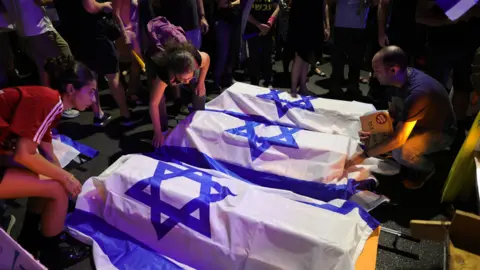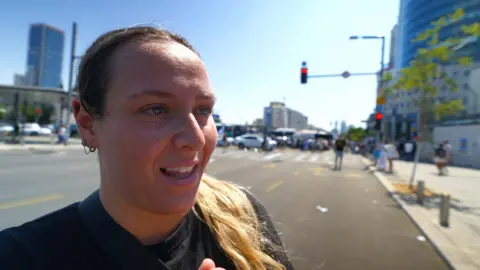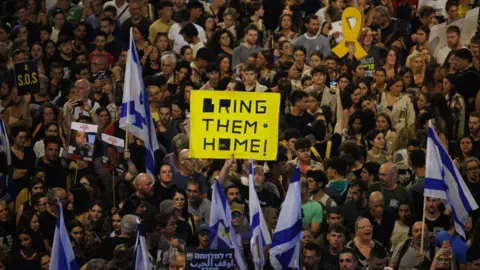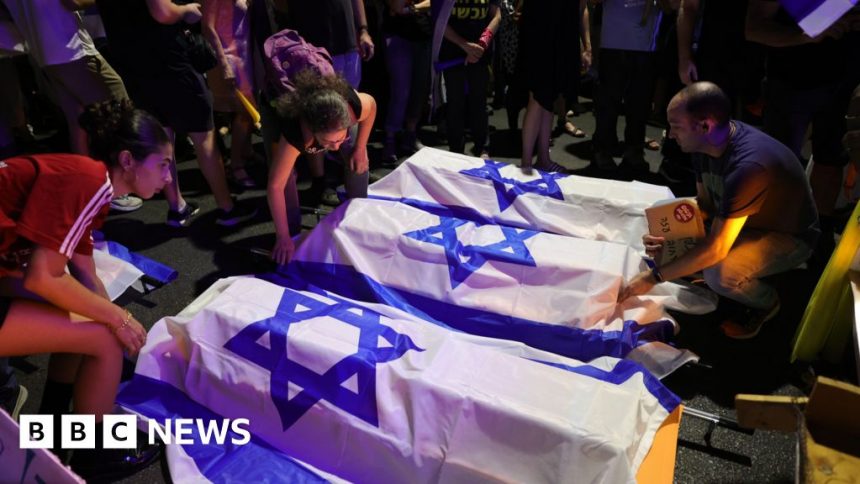Hostage deaths leave Israeli protesters at ‘breaking point’
 EPA
EPAOn Monday evening, protestors carried empty coffins past Israeli Prime Minister Benjamin Netanyahu’s house – the burden he carries is much heavier, they say.
Since six Israeli hostages were found dead in a Gaza tunnel last weekend, the weight of the war there has hung heavier on Israel’s leader.
“I think the fact that they were alive and murdered right before they could have been saved – that broke it,” said Anna Rubin, who joined a protest in Tel Aviv.
“That’s a breaking point for a lot of people – [they] are on the edge of their seat, and they realise that sitting at home is not going to do anything.”

Tens of thousands of people took to the streets again on Monday, after mass demonstrations flooded Tel Aviv last night. Many want to see this moment as a turning point, but Prime Minister Netanyahu has been here before.
He’s lived through months of these street protests – and years of similar ones. Protected by a parliamentary majority, his strategy has largely been to ignore their demands.
But then, if Mr Netanyahu isn’t listening, many people in Israel are not protesting.
A one-day general strike, called by the country’s labour union, was very patchily observed – even in Tel Aviv, the country’s beach-side liberal heartland.
Shops and restaurants in the city centre were mostly open, after briefly closing in solidarity with the protest on Sunday night.
“I don’t agree with the decision,” one of the staff at local cafe told me. “We should have closed.”
Tamara was picking up a street scooter, in large shades and perfect lipstick. “I don’t agree with the strike,” she said. “We want the hostages back – but we can’t stop everything; we need to live.”
Twenty-three-year-old Niva said she was surprised to see so many places open. “The country is in a very confrontational mood now,” she said.
But the most striking confrontation isn’t happening in the streets.
In a live press conference on Monday night, Mr Netanyahu defied anyone to demand more concessions from Israel in its negotiations over a hostage and ceasefire deal, brokered by the US.
“These murderers executed six of our hostages; they shot them in the back of the head,” he said. “And now, after this, we’re asked to show seriousness? We’re asked to make concessions?”
The message that would send to Hamas, he said, would be: “kill more hostages [and] you’ll get more concessions.”
 Getty Images
Getty ImagesHe said no-one who was serious about achieving peace and freeing the hostages – including US President Joe Biden – would ask him to make more concessions.
A short while earlier, Mr Biden, when asked by reporters, said he didn’t think Israel’s prime minister was doing enough to secure a ceasefire deal.
A key demand of Hamas is that Israel withdraws all its forces from a strip of land along Gaza’s border with Egypt, known as the Philadelphi Corridor.
Israel’s security chiefs, including the defence minister, Yoav Gallant, have been widely reported in local media as supporting alternatives to keeping troops on the ground.
Mr Gallant has publicly pressed the cabinet to back a proposed compromise.
The most dangerous moment of Israel’s previous mass protests, sparked by Mr Netanyahu’s judicial reform plans, was when he tried to sack Mr Gallant – and was then forced to reinstate him.
If he tried that again, says political analyst Tamar Hermann of Israel’s Democracy Institute, that could be the real turning point for protests here.
The threat to him from demonstrators now, she says, is “zero”.
Most are left-leaning critics whose opposition to the prime minister runs far deeper than the hostage crisis in Gaza.
“Netanyahu knows better than I do,” she said, “the best thing is to let it play as a safety valve – let people say, ‘we hate you, you are a murderer’.”
Prime Minister Netanyahu, protected by his parliamentary majority, seems to believe he can ride out the demands for a deal being made from the street, at least for now.
But the demands from his own defence minister, from the US president, could prove harder to ignore.







